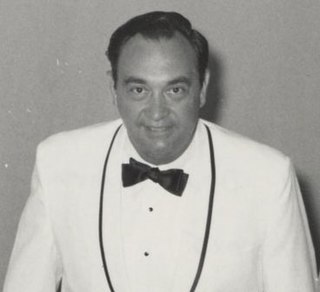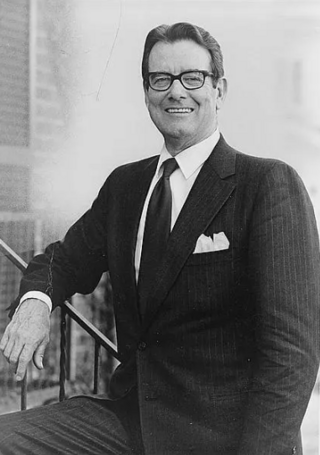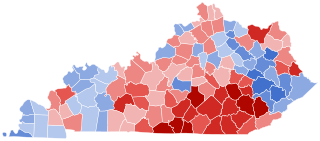
Louie Broady Nunn was an American politician who served as the 52nd governor of Kentucky. Elected in 1967, he was the only Republican to hold the office between the end of Simeon Willis's term in 1947 and the election of Ernie Fletcher in 2003.

The 1972 United States Senate elections were held on November 7, with the 33 seats of Class 2 contested in regular elections. They coincided with the landslide re-election of Republican President Richard Nixon. Despite Nixon's landslide victory, Democrats increased their majority by two seats. The Democrats picked up open seats in Kentucky and South Dakota, and defeated four incumbent senators: Gordon Allott of Colorado, J. Caleb Boggs of Delaware, Jack Miller of Iowa, and Margaret Chase Smith of Maine. The Republicans picked up open seats in New Mexico, North Carolina, and Oklahoma, and defeated one incumbent, William B. Spong Jr. of Virginia.

John Young Brown Jr. was an American politician and entrepreneur from Kentucky. He served as the 55th governor of Kentucky from 1979 to 1983, and built Kentucky Fried Chicken (KFC) into a multimillion-dollar restaurant chain.

The 2007 Kentucky gubernatorial election was held on November 6, 2007. In this election, incumbent Republican Governor Ernie Fletcher ran for reelection to a second term, but was soundly defeated by Democratic challenger Steve Beshear. A primary election to determine the Republican and Democratic nominees for governor was held on May 22, 2007, in which Fletcher and Beshear won their respective primaries. Steve Beshear's son Andy was elected Kentucky's State Attorney General in 2015 and Kentucky's Governor in 2019 and 2023.
Henry Ward was an American Democratic politician from Kentucky who held positions in state administrations and was his party's nominee for governor in 1967. Ward lost the general election to Republican Louie B. Nunn, who received 454,123 votes (51.2%) to Ward's 425,674 (48.0%).
Harvey I. Sloane, a physician and Democrat, served two terms as Mayor of Louisville, Kentucky and also a term as county judge-executive of Jefferson County, Kentucky. He narrowly lost two Democratic primaries for Governor of Kentucky and lost a race for the United States Senate to incumbent Mitch McConnell.

John Bayne Breckinridge was an American politician, a Democrat who served as Attorney General of Kentucky twice and also served as a member of the United States House of Representatives from Kentucky.
Walter Terry McBrayer was an American lobbyist, attorney, and Democratic politician.

The 2003 Kentucky gubernatorial election was held to elect the Governor of Kentucky on November 4, 2003. Republican candidate Ernie Fletcher defeated Democrat Ben Chandler and became the first Republican governor of Kentucky in 32 years.

The following table indicates the party of elected officials in the U.S. state of Kentucky:

The 1991 Kentucky gubernatorial election took place on November 5, 1991. Incumbent Governor Wallace Wilkinson was not eligible to seek a second term due to term limits established by the Kentucky Constitution, creating an open seat. At the time, Kentucky was one of two states, along with Virginia, which prohibited its governors from serving immediate successive terms. The Democratic nominee, Lieutenant Governor Brereton Jones, defeated Republican nominee and U.S. Congressman Larry J. Hopkins to win a term as governor.

The 2016 United States House of Representatives elections in Kentucky were held on November 8, 2016, to elect the six U.S. representatives from the state of Kentucky, one from each of the state's six congressional districts. The elections coincided with the 2016 presidential election, as well as other elections to the House of Representatives, elections to the United States Senate and various state and local elections. The primaries were held on May 17.

The 2019 Kentucky gubernatorial election took place on November 5, 2019, to elect the governor and lieutenant governor of Kentucky. The Democratic nominee, Kentucky Attorney General Andy Beshear, defeated Republican incumbent Matt Bevin by just over 5,000 votes, or 0.37%, making this the closest gubernatorial election in Kentucky since 1899 by total votes, and the closest since 1915 by percentage. It was also the closest race of the 2019 gubernatorial election cycle.

The 1960 United States Senate election in Kentucky took place on November 6, 1960. Incumbent Republican Senator John Sherman Cooper, who won a 1956 special election to fill the vacant seat of Alben Barkley, was elected to a full term in office, defeating Democratic former Governor and Undersecretary of Labor Keen Johnson.

The 1972 United States Senate election in Kentucky took place on November 7, 1972. Incumbent Republican Senator John Sherman Cooper retired, and Democratic State Senator Walter Dee Huddleston narrowly won the open seat over former Republican Governor Louie Nunn.

The 1987 Kentucky gubernatorial election was held on November 3, 1987. Democratic nominee Wallace Wilkinson defeated Republican nominee John Harper with 64.50% of the vote.

The 1983 Kentucky gubernatorial election was held on November 8, 1983. Democratic nominee Martha Layne Collins defeated Republican nominee Jim Bunning with 54.50% of the vote, replacing outgoing governor John Y. Brown Jr., and becoming the first female governor of Kentucky.

The 1967 Kentucky gubernatorial election was held on November 7, 1967. Republican nominee Louie Nunn defeated Democratic nominee Henry Ward with 51.20% of the vote. Nunn became the first Republican elected since 1943.

The 1963 Kentucky gubernatorial election was held on November 5, 1963. Democratic nominee Ned Breathitt defeated Republican nominee Louie Nunn with 50.74% of the vote.

The 1968 United States Senate election in Kentucky took place on November 5, 1968. Incumbent Republican U.S. Senator Thruston Morton retired from office. Jefferson County Judge Marlow Cook won the open seat.














